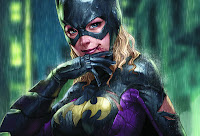Wednesday, December 17, 2014
The Hobbit: Thank God It's Finally Over
Peter Jackson returns to give us the third (and thankfully final) installment of his bloated adaptation of a 300-page children's book. As with The Hobbit: The Desolation of Smaug, the best things about the final entry to the franchise are Evangeline Lilly as Tauriel and Benedict Cumberbatch providing the voice of Smaug. However, Smaug's story ends fairly quickly (despite what the movie posters would have you believe he's on-screen for all of 20 minutes) and the series by this point is so packed with characters (five separate armies worth) Lilly gets far-less screentime than you'd want from the movie's most interesting character.
Since the Battle of Helm's Deep in The Two Towers Jackson's adaptations of the works of J. R. R. Tolkien have been a series of diminishing returns with a few bright spots (such as Smaug) that are increasingly obscured by the same CGI ogre action scenes and small character moments all of which have been done better in the previous films. And the stories aren't easily wrapped up as Jackson continues his plodding pacing to fill yet another two-and-a-half-hour film. I enjoyed The Lord of the Rings trilogy, and I've liked moments from the three separate Hobbit films, but oh my God am I thankful it's finally over.
After dealing with the remnants of the Smaug storyline and giving Bard (Luke Evans) his heroic moment, the movie moves forward with the fight to control Erebor now that it isn't inhabited by a gold-crazed dragon. Of the five armies you have Thorin Oakenshield (Richard Armitage) and his company, the men of Dale led by Bard, an army of elves led by Thranduil (Lee Pace), the Eagles led by Radagast (Sylvester McCoy), an army of Dwarves led by Dain II Ironfoot (Richard Armitage), and two separate armies of Goblins, Trolls, Wargs, and Bats led by Azog (Manu Bennett). Yes, the fact that number is actually seven separate fighting forces (not five) is a bit perplexing.
Given how much time it takes to set-up everything necessary for the final battle, Jackson has plenty of time for various subplots including Thorin's gold madness, Bilbo's (Martin Freeman) betrayal, Alfrid Lickspittle (Ryan Gage) being a weasily little shit, Gandalf (Ian McKellen) getting out of trouble with the Necromancer and Nazgûl, and a slimmer of storyline for Legolas (Orlando Bloom) and the conflicted Tauriel whose feelings for Kili (Aidan Turner) leave her compromised. And, not surprising, afterwards we get the same type of epilogue Jackson overused in The Return of the King in his attempt to (unnecessarily) further tie the entire movie franchise together. (I think we all realized by the 20+ hours of movies we've seen how they fit together without the Cliff's Notes ending.)
Don't get me wrong, The Hobbit: The Battle of the Five Armies isn't an awful film (although I wouldn't necessarily call it a good one either), but by itself it offers almost nothing new other than an opportunity to spend time with characters who were more interesting in other films, and as a concluding chapter it's anti-climactic at best. Is it worth seeing for completion's sake? Sure, but I don't plan on returning to this part of Middle Earth anytime soon (if ever).
Subscribe to:
Post Comments (Atom)














































No comments:
Post a Comment